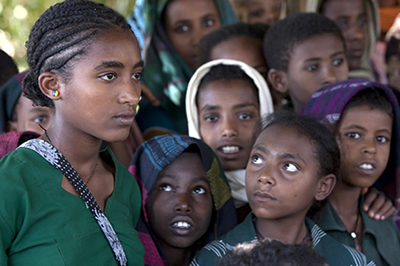This week, the UN Commission on the Status of Women (CSW) will bring together thousands of leaders from around the world who are working to eliminate all forms of violence against women and girls. Government representatives, women’s rights advocates, and NGO leaders will convene in New York for two weeks from March 4 – 15 to explore policy and program strategies to end violence against women and girls.

The focus on violence is desperately needed –1 in 3 women will be beaten, raped, abused, or mutilated in their lifetimes. Though widely underreported, gender-based violence negatively affects the mental, physical, and psychological health of millions of women and girls around the world. Adolescent girls are especially vulnerable to violence – they are often even more socially and economically marginalized than older women, and legal frameworks in many countries do little to protect their rights.
The enormity of this problem demands that both governments and civil society develop new strategies to protect women and girls from violence – including programs that prevent violence from occurring, policies and funding that provide quality care and treatment, counseling and resources to enable survivors to leave abusive relationships, and laws that protect victims and ensure prosecution of perpetrators.
Since 2009, the Adolescent Girls’ Advocacy & Leadership Initiative (AGALI) has invested in innovative solutions to address the challenges facing adolescent girls around the world, including gender-based violence. Recognizing the magnitude of social, political, and legal reform necessary to protect girls and women, AGALI collaborates with local experts to develop game-changing solutions that improve laws, policies, and programs for adolescent girls.
Protecting Children in Liberia
In Liberia, AGALI works with Aisha Cooper Bruce and Rosanna Schaack, who successfully advocated for the passage of the National Children’s Law. During Liberia’s 14-year civil war, up to 75% of women and girls suffered rape and sexual violence, and girls in Liberia continue to be socially marginalized. This landmark legislation outlaws harmful traditional practices, including child marriage and female genital mutilation, and will transform the future of Liberia’s children for generations to come.
Ending Child Marriage in Malawi
While official statistics concerning rape and murder are lower in than in Guatemala or Liberia, Malawi’s violence against women and girls often takes another form – child marriage. Almost 50% of Malawian girls are victims of child marriage, and are at far higher risk of dropping out of school, suffering domestic violence, living in poverty, and dying in childbirth than their unmarried counterparts.
In Malawi, AGALI collaborates with national advocates, village chiefs, and community-based organizations to enable young women to raise their voices and create their own solutions to ending child marriage. AGALI is partnering with the Girls’ Empowerment Network, an organization led by young women that has successfully advocated with village leaders to implement bylaws that outlaw child marriage and penalize offenders by requiring them to make a significant payment of goats.
AGALI leaders in Malawi have also created the Adolescent Girls’ Advocacy Network (AGANET), a national network advocating to increase Malawi’s legal age of marriage from 15 to 18 years of age. AGANET’s member organizations have trained hundreds of girl leaders to advocate for passage of the new marriage law, organized nationally televised events focused on the issue, and met with dozens of high-level government decision-makers to encourage them to end child marriage. Malawi’s Parliament is scheduled to vote on a new Marriage Bill in 2013.

